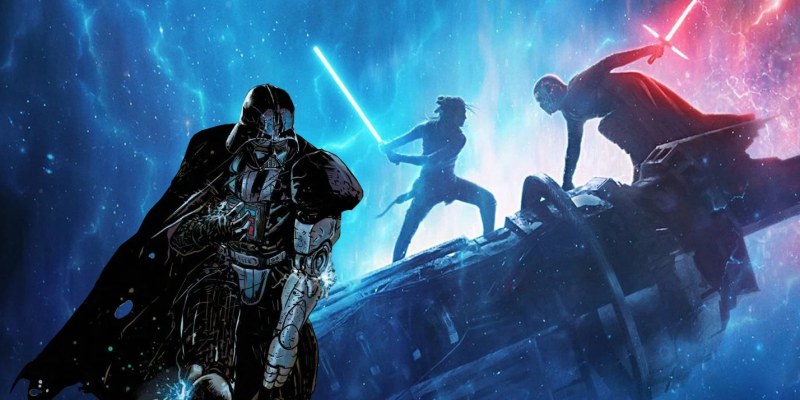If I never hear the name “Exegol” again, it’ll be too soon. No, I’ve not been rewatching Star Wars Episode IX: The Rise of Skywalker; I’ve been plowing my way through the second run of Marvel’s Darth Vader comic. And I do mean plowing, since the last few issues, which take their cues from the final entry in the Skywalker Saga, have really felt like hard work.
While Star Wars Episode VIII: The Last Jedi was certainly divisive, it told a coherent story that, for the most part, supported Star Wars canon. The fact that starship fuel suddenly became an issue, having barely figured into any of the other movies, was jarring, but it all held together. The Rise of Skywalker, on the other hand, was a narrative mess, and it’s still bleeding into other Star Wars media.
Walking out of the cinema, I was left with so many questions. How did the Emperor, clone or otherwise, permanently transfer his consciousness across half a galaxy? What was the point of Snoke and the First Order anyway? How did Palpatine build all those ships?
Also, how did he find people who would be okay living underground for 35 years? You’d think that, at some point, Richard E. Grant would mutter “Bollocks to this,” steal a few Star Destroyers, and set out to start his own little empire.
A month or so later, I’d pushed it to the back of my mind. The problem is that Lucasfilm or Disney has decided that it’s not enough to just move past The Rise of Skywalker; it needs fixing, and it’s up to Marvel’s Star Wars comics to do the work.

At first, the comics dipped a toe in with spin-offs and one-shots, a reference here and there. Take Star Wars #12, which was left to flesh out the Dameron family after The Rise of Skywalker turned Poe Dameron into a former drug smuggler. But with Star Wars: Darth Vader, Marvel has really taken the plunge. The rot starts with Darth Vader #5, with the introduction of Ochi of Bestoon, who spent most of The Rise of Skywalker as a corpse. By issue #11, Vader is bearing the full weight of The Rise of Skywalker like some bucket-headed, crispy-skinned Atlas.
Granted, it’s not the first time other Star Wars media have been tasked with doing the heavy lifting, compensating for a flawed plot. James Luceno’s Dark Lord: The Rise of Darth Vader succeeded in bridging the gap between Revenge of the Sith’s angsty teenager and the Darth Vader of A New Hope, but that substory was seamlessly woven into the story. In Darth Vader, it’s as disjointed and in-your-face as the movie it’s trying to sort out.
Issue #11 begins with Darth Vader surfing into Exegol on Cthulhu’s cousin. A couple of pages or so later, he’s being charged by The Rise of Skywalker’s robed Sith cultists. What happened to the Sith’s Rule of Two, one master and one apprentice, the rule that all the other movies have adhered to? Apparently keeping spares doesn’t count.
“Any one of these might replace you,” cackles Palpatine, diluting his menace with the revelation that he’s not actually that clever; he just buys in bulk. An extra Death Star here, army of cultists here, thousands of Star Destroyers there, as you do.
Yes, Darth Vader #11 tries to explain away the Magic Star Destroyers, one of several attempts to cement over The Rise of Skywalker’s plot holes. It’s revealed they weren’t actually constructed while Palpatine was in hiding; they were mostly complete before Return of the Jedi. So, instead of propping up The Rise of Skywalker, it’s undermining everything that went before it. Who needs a fully operational battle station when you’ve got an armada of planet-killing ships?

I could go on, but none of Darth Vader’s explanations really land, creating new plot holes rather than plugging them. What’s especially frustrating is that when Star Wars comics work, they really work. They’re at their best when they’re expanding and exploring the universe established by the Star Wars movies, not struggling to compensate for a film’s failings.
The original 2015 Darth Vader run, for example, did a spectacular job of depicting the sometimes fragile power dynamic between Vader and the Emperor. It also introduced archaeologist and thief Doctor Aphra, who went on to star in her own award-nominated series. Likewise, the main Star Wars comic, apart from having Luke and friends slaughter their way through a lot of stormtroopers, tackled the problem of building alliances and putting together a force to stand against the Empire. Lando may have been able to raise a fleet by snapping his fingers, thanks to J.J. Abrams, but Leia had to put Mass Effect 3 levels of work in.
Ultimately, I don’t blame the writers for turning Darth Vader into one long patch job for The Rise of Skywalker. In all likelihood, the command came from on high, in a misguided effort to fix it. It was never a good sign that, aside from Palpatine’s speech being exclusive to Fortnite, parts of the plot were squirreled away in the Star Wars: The Rise of Skywalker Visual Dictionary.
I’m hoping that the next Darth Vader is the last we’ll see of The Rise of Skywalker, in comic form at least, and that the next issue of Marvel’s Star Wars isn’t dedicated to D-O, Rise’s duck-headed droid. Because with The Mandalorian and The Bad Batch delivering solid serialized stories, it’s time to draw a line under The Rise of Skywalker and let Star Wars comics really shine.
